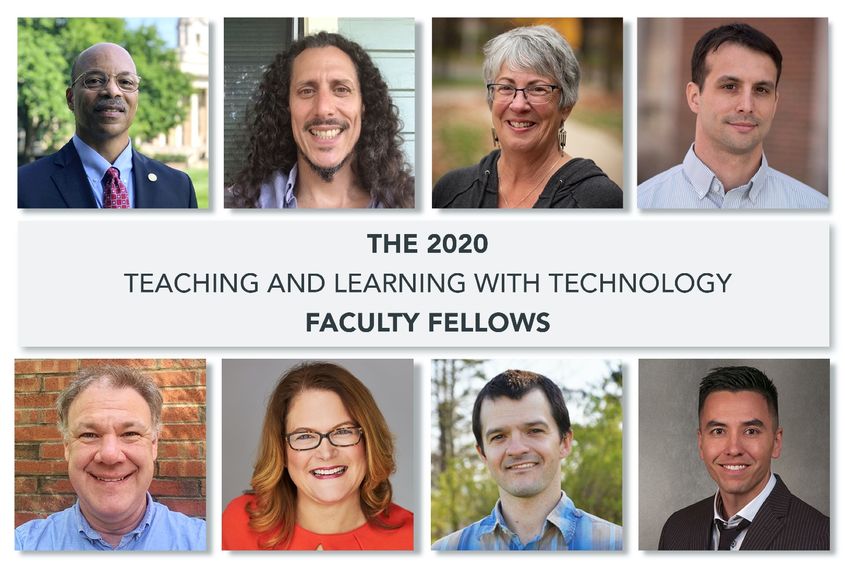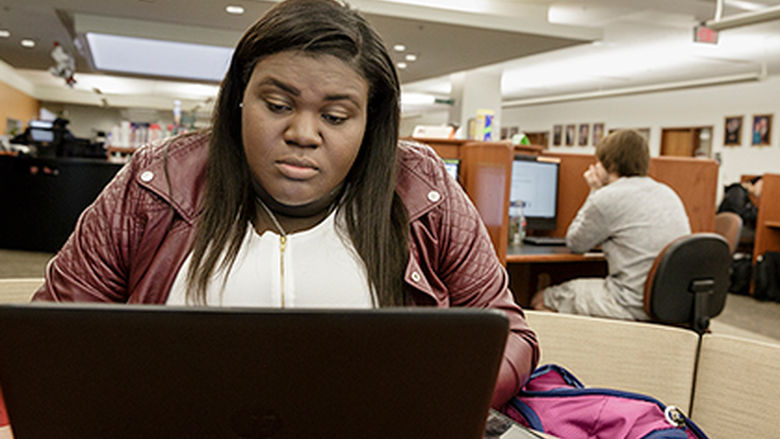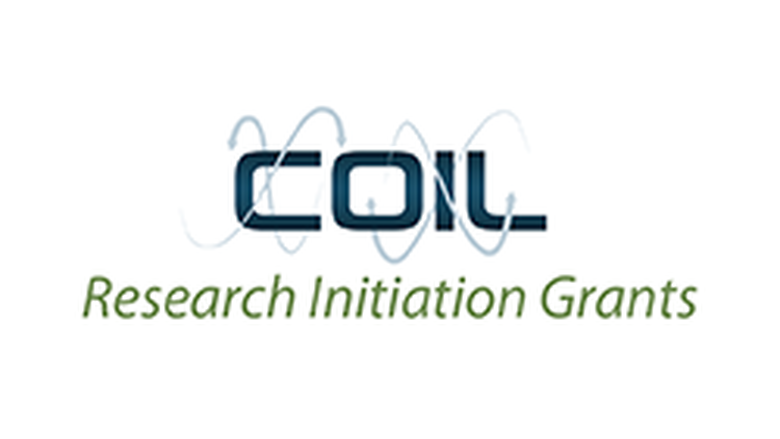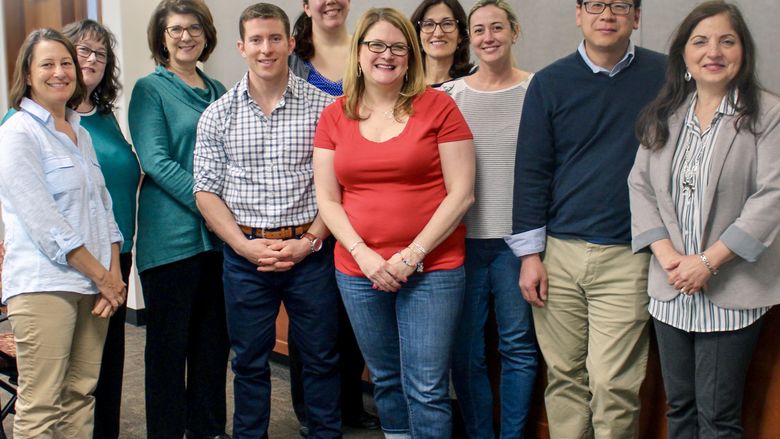
The 2020 TLT faculty fellows, clockwise from top-left; Tom Hogan, Jamie Garcia Prudencio, Margaret Hoffman, Adrian Barragan, Randy McEntaffer, Justin Brown, Dawn Pfeifer-Reitz, and Jan Reimann
UNIVERSITY PARK, Pa. — Penn State’s Teaching and Learning with Technology (TLT) has welcomed eight instructors as members of the newest Faculty Fellows cohort. During the 2020-21 academic year, the projects of Justin Brown, along with colleagues Adrian Barragan and Jamie Garcia Prudencio, Margaret Hoffman, Tom Hogan, Randy McEntaffer, Dawn Pfeifer Reitz and Jan Reimann will, in their unique ways, focus on student engagement.
"The current state of higher education has placed a bright spotlight on the need to keep students involved with and participating in their coursework," said Bart Pursel, director of innovation with TLT. “We’re thrilled to welcome this year’s TLT Faculty Fellows whose projects are dedicated to student engagement and how technology can help take it to new heights.”
Throughout the 2020-21 academic year, the fellows will work with a dedicated team of TLT staff to realize the goals set forth by their projects. They cover an array of topics that are strongly influenced by each fellow’s discipline and background.
Adrian Barragan, Justin Brown, and Jamie Garcia Prudencio — "Immersive Experience Learning (IMEL) Technology Application to Veterinary and Animal Sciences Educational Materials"
Barragan, an assistant clinical professor in the Department of Veterinary and Biomedical Sciences; Brown, an assistant teaching professor in the Department of Veterinary and Biomedical Sciences; and Prudencio, an assistant teaching professor for Spanish in agriculture in the College of Agricultural Sciences, intend to use their project to engage students through immersive technology.
The three instructors have outlined a series of 360-degree videos that aim to give students in Comparative Vertebrate Anatomy (VBSC 421) access to course content they would not otherwise receive.
"The lab component of VBSC 421 trains students to identify anatomic structures and how they relate to function," said Brown. "They're exposed to a wide diversity of animal taxa at various stages of the lab; however, most of the dissections focus on the lamprey, shark and domestic cat. Immersive technology can help provide a more engaging level of exposure to large animal anatomy like horses, pigs, cows and deer."
Along with their course-specific immersive content, Barragan, Brown, Prudencio, and the rest of their team will develop a step-by-step protocol for including 360-degree video in coursework. The instruction document, including photos and short videos, will be available to faculty across Penn State upon request. They will also survey students to assess their perceptions of, and satisfaction with, the immersive content.
Margaret Hoffman — "PILLAR Project: Place-based Immersive Learning for Landscapes"
Hoffman, an assistant professor of landscape contracting in the Department of Plant Sciences within the College of Agriculture, will use her project to work towards increasing students’ sense of investment in their education through immersive technology. Through collaborative learning between institutions, place-based learning, and immersive technology, her project aims to create virtual field-trip experiences for Penn State landscape design students.
“Current health concerns and limited resources make study abroad and study away programs challenging, if not impossible," said Hoffman. "Studies of immersive technology and virtual field trips have uncovered some advantages. So, it's important to continue working to understand how these tools can help provide out-of-the-classroom experiences essential to student growth and development."
Hoffman and her team will look to create engaging work for students by having them film significant regional landscape design installations, create an immersive tour, and conduct a lesson focusing on the site’s design principles and elements. Another goal of the project is the creation of a Faculty Learning Community to share lessons and best practices of engaged, place-based learning across disciplines.
Tom Hogan – "The Virtual Transformational Leadership Development (VTLD) Experience"
Hogan, a professor of practice in human resource management in the College of Liberal Arts' School of Labor and Employment Relations, wants to use student engagement to help accelerate undergraduates' development of global leadership skills. His project team plans to utilize virtual experiential learning practices and reflective exercises to help develop shared skills by influential, impactful leaders.
“Transformational leaders possess the ability to unlock the talents, gifts, potential and so much more from the people who follow them,” said Hogan. “By using the arts as an agent of change, delivering content virtually, incorporating interactive reflection exercises, and employing the help of a leadership development coach, the VTLD Experience can deliver a customized transformational experience to undergraduate students.”
The vision for Hogan's project, as it grows, includes a machine learning and artificial intelligence component. These technologies can be utilized to personalize and improve the VTLD Experience as more data becomes available. Additionally, cloud-based storage will be used so that the project's work can be scaled across Penn State and domestic and international higher-learning institutes.
Randy McEntaffer — "Exploring the Universe through Virtual Reality"
McEntaffer, professor in the Departments of Astronomy and Astrophysics, Physics, and Materials Science and Engineering, and his team will embark on a project with the potential to impact thousands of Penn State undergraduate students who take introductory astronomy courses each year. Their goal is to overcome the physical limitations of engaging with astronomy course materials by utilizing a virtual reality (VR) application called "Titans of Space.”
“We want this project to provide students with physically engaging content that conveys complex astronomical concepts through self-led demonstration,” said McEntaffer. “By augmenting traditional lecture-based content with virtual reality-based lessons, we believe we can then assess student interest and engagement as well as their understanding of the material."
McEntaffer’s team will divide its work over this academic year into three phases, initially working with a small group of students and assessing their individual experiences with VR-based astronomy coursework. In spring 2021, the final stage will use assessment results from the first two for the creation of VR content that will be incorporated into an ASTRO 001 lecture on the solar system. The students' answers to the questions regarding their experience with VR-enabled learning could provide valuable insight toward gauging the difference between traditional learning and learning with immersive technology.
Dawn Pfeifer Reitz — "Elevating Your Game: There’s an App/Module/Tool for That"
Pfeifer Reitz, assistant teaching professor and CAS 100 coordinator at Penn State Berks, recognizes a gap between "soft skills" that employers value, like oral and written communication and adaptability, and how they fit into the rigid academic constraints of STEM programs. Her fellows project will work towards creating a digital “tool kit” that will engage students with specific work designed to improve their soft skills.
“This project is a wonderful opportunity to bridge the educational gap between what students are taught in their STEM curricula and other skills they need to succeed in professional life,” said Pfeifer-Reitz. “Along with potential career impact, these ‘soft skills’ that our project will promote can help improve student sociability, increase campus engagement, and improve in-class group work.”
Pfeifer Reitz and her team are setting out with the goal of marrying the technology aspect of teaching and learning — using an app, module, or tool to use "soft skills" to help create an elevator pitch — with the personal engagement aspect of connecting with students. They are also taking into account that different levels of students would perform various types of work to improve their "soft skills." So, they are intentionally molding their project to deliver an end product that is flexible and scalable across the University.
Jan Reimann — "Learning Math with Jupyter Notebooks"
Reimann, associate professor of mathematics in the Eberly College of Science, and his team aim to take advantage of Jupyter Notebooks' open-source platform and their built-in interactivity to create affordable, engaging course content for undergraduate math students at Penn State.
“Instead of relying on static data in a traditional calculus textbook, a Jupyter-based course can pull data in real-time from various sources like financial markets or sports statistic databases," said Reimann. "This gives instructors, and students access to much more current and relevant content, which can help improve engagement. For example, in March 2020, I demonstrated a Jupyter Notebook to my Math 110 course and explained the basic features of logistic functions by modeling the latest COVID-19 data.”
Reimann and his team will work toward creating a content library and collecting data sources that will allow for the creation of interactive notebooks within Penn State's math department long after the fellowship project has concluded. Additionally, they recognize their project's potential to increase the overall accessibility to Project Jupyter at Penn State and help organize the University’s existing Jupyter community.
To learn more about the TLT Faculty Fellows program, email fellows@psu.edu.


